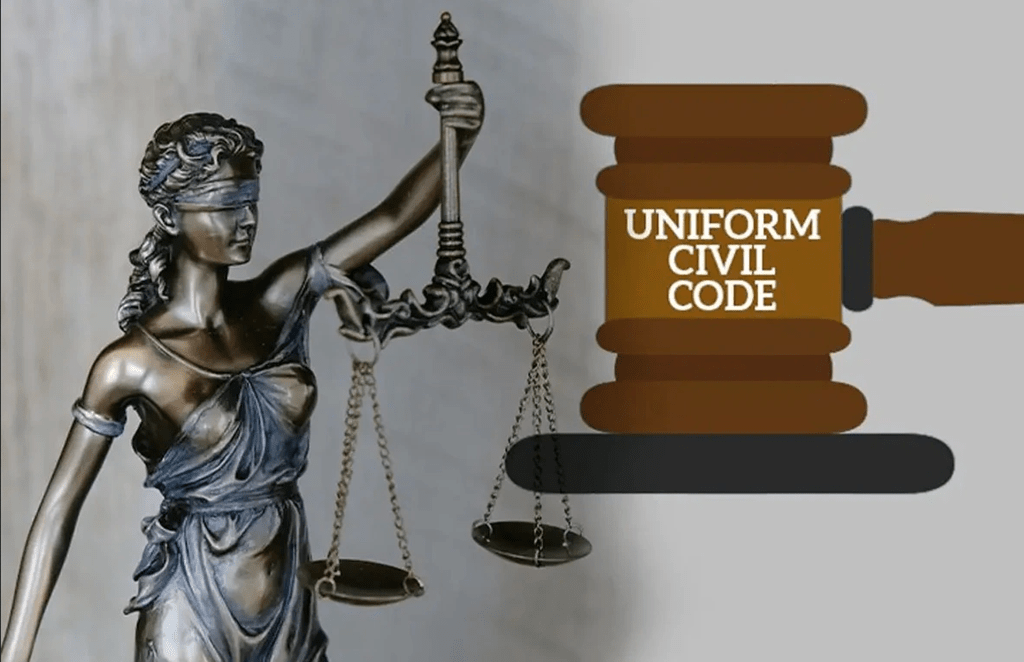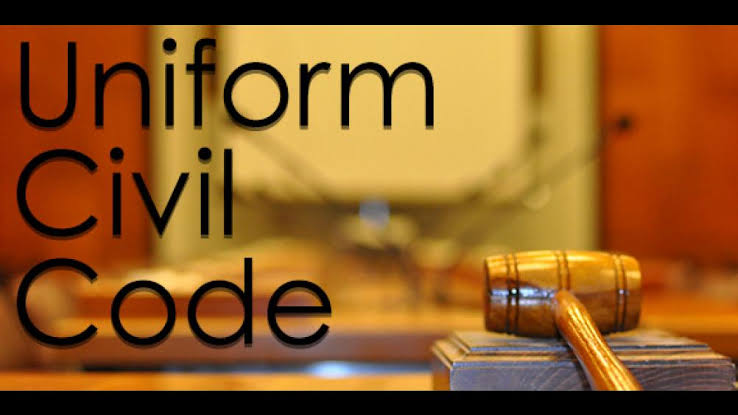Introduction
The Uniform Civil Code (UCC) is a concept that advocates for a common set of civil laws for all citizens of a country, regardless of their religion, ethnicity, or gender. In India, the inclusion of UCC stems from the Constituent Assembly’s desire for and incapability of replacing diverse personal laws with a uniform legal framework. The existence and persistence of varying personal laws remain an enduring legacy of the Raj.

Evolution of UCC
The early “Company Courts” of the Subcontinent relied on the religious dictates of natives as the fons juris. Muslim litigants were bound by the word of the Quran, as interpreted by a Maulvi, and Hindus by the Hindu canon of Shrutis and Smritis, along with local customs as analyzed by Brahmin Priests in all matters of property, marriage, contracts, and other civil disputes.[1] As the Company Raj transformed into the British Raj, so did the desire of the colonizers towards the assimilation of Indian law with common law traditions. Consequently, all civil matters and transactions were made subject to statutes that codified common law principles or replicated British statutes for applicability in India.[2] However, the British refused to meddle with personal laws surrounding marriage, divorce, guardianship, and inheritance. In this realm, supremacy was left with religious doctrine.
This system, despite the Constituent Assembly’s drastic and Parliament’s incremental efforts has survived. Many in the Assembly supported the UCC, however, owing to the political climate and identity politics surrounding the partition, there was apprehension amongst many members that its enactment was a drastic move that would subvert religious freedom and autonomy, especially of minorities. For many Indians, it would make reality the purported woes of Jinnah that a Hindu majority India would de-Islamisize the Muslim population.[3] Consequently, the Assembly chose to kick the proverbial can down the lane by including the UCC as part of the Directive Principles of State Policy.[4] Although the reforms were delayed, by inserting Article 44 , the constitution makers restored constitutional morality.
As a result universal law for civil society in India has been a widely debated constitutional, social and political subject and its conflicts with religious freedom and autonomy have been the lynchpin of its criticism. This essay will explore the significance of a law which is universally applicable to all citizen and cite relevant case laws that highlight the need for its implementation.
We would proceed to examine the case of UCC from various perspectives and would examine whether legislative action is required to make a law.
Rationale for Uniform Civil Code
Equality before the law
One of the fundamental principles of any democratic society is equality before the law. The existence of multiple personal laws, based on religion or other factors, can lead to inequality and discrimination. Implementing a UCC would eliminate such disparities and ensure that all citizens are treated equally under the law. The Indian Supreme Court, in its landmark judgment in the case of Sarla Mudgal v. Union of India[5], emphasized the need for a UCC, stating that it would promote national integration and unity.
Gender justice and women’s rights
Personal laws often discriminate against women, particularly in matters of marriage, divorce, inheritance, and maintenance. A UCC would provide a common framework that upholds the principles of gender justice and protects women’s rights. The case of Shah Bano v. Mohammad Ahmed Khan[6] in India highlighted the need for uniformity in divorce laws and maintenance provisions, thereby reinforcing the significance of a UCC to ensure gender equality.
Secularism and religious freedom
A UCC does not imply the imposition of a uniform religious code; rather, it seeks to establish a common set of civil laws that are applicable to all citizens irrespective of their religious beliefs. It respects the principles of secularism and religious freedom while safeguarding the interests of individuals and society as a whole. The Supreme Court of India, in the case of John Vallamattom v. Union of India[7] , stressed that a UCC would preserve the secular fabric of the nation.
Social cohesion and national integration
The presence of different personal laws can lead to social divisions and hinder the process of national integration. A UCC promotes social cohesion by fostering a sense of unity and shared values among citizens. The Supreme Court of India, in the case of Lily Thomas v. Union of India[8], highlighted the importance of a UCC in promoting a sense of common identity and national integration.
Efficiency and administrative simplicity
Personal laws often result in a complex and fragmented legal system, requiring separate legal provisions for different communities. A UCC simplifies the legal framework by consolidating laws, reducing administrative burden, and enhancing the efficiency of the justice system. This can lead to better governance, improved access to justice, and reduced legal complexities.
Human rights and international obligations:
India being a signatory to the Universal Declaration of Human Rights, Convention on the Elimination of Discrimination Against Women, the ICCPR and ICESCR which emphasize the principles of equality, non-discrimination, and women’s rights. Implementing a UCC aligns with these principles and ensures compliance with international obligations, thereby enhancing a nation’s commitment to human rights standards and global norms.
Conclusion:
The implementation of a Uniform Civil Code is a progressive step toward achieving equality, justice, and social harmony. By eliminating discriminatory practices and promoting gender justice, a UCC would ensure the fundamental rights of citizens, regardless of their religion or gender. The case laws discussed above demonstrate the need for a UCC in promoting equality before the law, protecting women’s rights, upholding secularism, and fostering national integration. It is imperative for societies to embrace this concept to create a fair and harmonious society where every citizen is treated equally under the law.
[1] Bernhard Cohn, Colonialism and forms of Knowledge (Princeteon University Press 1996) 57
[2] Id.
[3] Ramesh Sharma, ‘What framers of our Constitution said about UCC and why they didn’t implement it’ (India Today, Jul 31, 2023) < Uniform Civil Code: What framers of our Constitution said about UCC and why they didn’t implement it – India Today> accessed 13 August 2023
[4] The Constitution of India, Article 44
[5] 1995 SCC (3) 635
[6] AIR 1985 SC 945
[7] (2003) 6 SCC 611
[8] AIR 2000 SC 1650






One thought on “Uniform Civil Code – Empowering Equality and Justice”